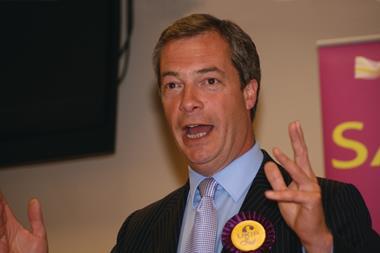There is less than a year to go before the next general election.
We know this for certain because under the Fixed Term Parliaments Act it will be held on Thursday 7 May 2015; but the outcome is as difficult to predict as ever.
The European and local elections offered little to help us. UKIP did well because so many voters wanted to send a message that they don’t think the political establishment takes immigration seriously enough.
The majority of these were undoubtedly old Tory. The party’s biggest gains were in the traditional Tory heartland of Essex but it also did well in Labour strongholds such as Rotherham, the clearest sign that, as its leader Nigel Farage is keen to point out, the party now attracts voters from across the board. Conservative losses were mild for a party in government, although losing Hammersmith & Fulham to Labour was an unexpected blow. Labour won seats but nowhere near enough for a party hoping to win in 2015. The Liberal Democrats were wiped out in Europe and were the night’s terrible losers - talk of defenestrating Nick Clegg has still not subsided.
The same pattern emerged in Newark’s by-election. The Tory vote was predictably down but enough to secure a respectable majority, UKIP forced itself into second place, Labour’s vote fell sharply and the Lib Dems came a miserable sixth behind the Greens and an independent.
So what does this tell us about 7 May next year? First, that turnout is likely to be high. When the result was predictable (think Tony Blair in 2001 and 2005), turnout hovered at about 60%. This rose to 65% in 2010 precisely because voters knew there was a real fight on, and the same is likely to be true this time. Second, the Lib Dems will not be entirely wiped out although they could well lose at least half their seats to both major parties.
Labour and the Conservatives are neck and neck in the polls and the last months of a parliament have always seen a rise in support for the governing party. The leak of Bill Grimsey’s toxic recommendations to Ed Miliband will do nothing to help Labour among farmers and shopkeepers. Labour’s hopes of just watching the government lose are crumbling as the UK economy picks up across the board and the economic policy Balls and Miliband have trumpeted have so patently failed in France.
The Conservatives have a mountain to climb because their failure to secure a boundary review this parliament means that Labour needs fewer votes to win power than they do. To counter this the Tories have developed a 40:40 strategy - 40 seats to win and 40 to defend. It makes sense. Labour will win South Shields as surely as the Conservatives will win Kensington, so concentrate fire power where it matters in the key marginals.
But then there is UKIP. Nigel Farage will almost certainly stand in Thanet South, a seat currently occupied by the Conservative Laura Sandys, who is retiring. He stood and lost there in 2005 but his party took seven of the eight county council seats this time, they are much better organised and he could well win. His is likely to be his party’s only outright success but the election will surely turn on how UKIP voters elsewhere affect those marginals. Half of those who voted for them this year have already said they have no intention of doing so in 2015 but that still leaves enough to do real damage, particularly to the Conservatives.
Much has been made by all their opponents of the obvious unsuitability of some UKIP candidates. Given how quickly it has grown it is hardly surprising that it does indeed harbour a fair sprinkling of nutters and racists but, frankly, so do all the parties. Insulting UKIP on that basis is counterproductive.
Conservatives, many of whom, while remaining loyal, make no secret of their admiration for Mr Farage, must develop a single mantra that must never waver.
A vote for UKIP, however attractive it looks, is a vote for Ed Miliband. That, and nothing else. I still believe the odds favour the Conservatives being the largest party. Whether that leads to a minority government or another coalition which includes or excludes them is an open question. There are some things, as even the most astute forecaster knows, that are just too difficult to predict.
Steven Norris is a former Conservative minister and London mayoral candidate. He is chairman of the National Planning and Infrastructure Association and of Soho Estates






























No comments yet